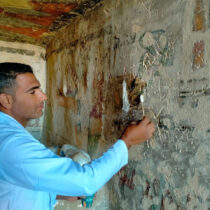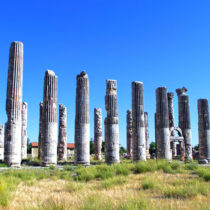Aretaeus from Cappadocia (2nd cent. A.D.) is considered one of the most prominent Greek physicians of the Roman period. In two of his eight extant books entitled On the causes and symptoms of acute diseases and On the cure of acute diseases, he refers to various diseases, such as neuritis, tuberculosis epilepsy, as well as to ileus. Aretaeus considers ileus as an intestinal inflammation, which is usually accompanied by colic pain. There are two causes, according to him, responsible for the development of ileus: the first has to do with the amount and quality of the intake of food and the second with an injury of the bowels. Aretaeus comments that ileus is a disease that can affect both the large and the small intestines. Furthermore, he refers to various types of ileus, depending on the severity of each case, and describes in detail the relevant symptoms and their clinical manifestation. He also admits that the intraabdominal abscess is a complication of ileus. As far as cure is concerned, Aretaeus suggests that pain should be treated first by anesthetics and then through various practices, such as vomiting, steam-baths, poultices, cupping, decoctions and diet, that aim at the removal of the trapped air from the intestines.
“Ileus” in Aretaeus of Cappadocia
30 Aug 2012
by Archaeology Newsroom
- A
- A
- A


